 1 citations,
August 2021 in “Journal of The American Academy of Dermatology”
1 citations,
August 2021 in “Journal of The American Academy of Dermatology” Baricitinib helped improve hair, eyebrow, and eyelash growth in alopecia areata patients.
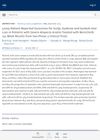 September 2024 in “Journal of the American Academy of Dermatology”
September 2024 in “Journal of the American Academy of Dermatology” Baricitinib helps long-term hair regrowth in severe alopecia areata patients.
 October 2023 in “Faculty Opinions – Post-Publication Peer Review of the Biomedical Literature”
October 2023 in “Faculty Opinions – Post-Publication Peer Review of the Biomedical Literature” Using both minoxidil and finasteride together on the scalp works better for male hair loss than using either one alone.
 October 2023 in “Journal of Cosmetic Dermatology”
October 2023 in “Journal of Cosmetic Dermatology” Using both minoxidil and finasteride together is more effective for hair growth than using either one alone in men with hair loss.
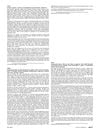 April 2016 in “Journal of The American Academy of Dermatology”
April 2016 in “Journal of The American Academy of Dermatology” Ixekizumab is effective and safe for patients who did not improve with etanercept treatment for psoriasis.
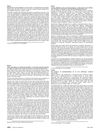 March 2014 in “Journal of The American Academy of Dermatology”
March 2014 in “Journal of The American Academy of Dermatology” Tavaborole is a safe and effective toenail fungus treatment, with the 5% solution being the best option.
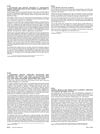 March 2005 in “Journal of The American Academy of Dermatology”
March 2005 in “Journal of The American Academy of Dermatology” The two lotions used day and night may be a good alternative to minoxidil for hair loss treatment with better cosmetic effects and tolerance.
Digit ratio likely doesn't predict male hair loss.
 June 2023 in “Skin Research and Technology”
June 2023 in “Skin Research and Technology” The supplement with amino acids, iron, selenium, and marine hydrolyzed collagen improved hair growth more than drug treatment alone, with most people tolerating it well.
 February 2004 in “The New England Journal of Medicine”
February 2004 in “The New England Journal of Medicine” The book is a comprehensive resource on hair disorders, but lacks information on some conditions.
 February 2004 in “The New England Journal of Medicine”
February 2004 in “The New England Journal of Medicine” The book is a comprehensive and current guide on hair disorders, with minor flaws.
December 2014 in “대한미용학회지” 3% peppermint oil promotes hair growth and has strong antibacterial properties.
 95 citations,
May 2012 in “British Journal of Dermatology”
95 citations,
May 2012 in “British Journal of Dermatology” Androgens block hair growth by disrupting cell signals; targeting GSK-3 may help treat hair loss.
 91 citations,
April 2017 in “Diabetes & Metabolic Syndrome: Clinical Research and Reviews”
91 citations,
April 2017 in “Diabetes & Metabolic Syndrome: Clinical Research and Reviews” Eating fewer calories, less sugar and refined carbs, and more low-glycemic and omega-3 rich foods can help manage PCOS symptoms.
40 citations,
August 2005 in “JEADV. Journal of the European Academy of Dermatology and Venereology/Journal of the European Academy of Dermatology and Venereology” Acitretin moderately improved skin and eye issues but not hair loss or light sensitivity in a 3-year-old with IFAP syndrome.
 37 citations,
January 2004 in “Hormone Research in Paediatrics”
37 citations,
January 2004 in “Hormone Research in Paediatrics” About 3% of high school girls aged 14-18 in Isfahan, Iran, have polycystic ovary syndrome.
 36 citations,
May 2021 in “Nutrients”
36 citations,
May 2021 in “Nutrients” Natural molecules like inositols, resveratrol, vitamins, and omega-3 fatty acids may help manage Polycystic Ovary Syndrome (PCOS), but their effects vary and need more exploration.
 30 citations,
October 2015 in “Journal of Ethnopharmacology”
30 citations,
October 2015 in “Journal of Ethnopharmacology” Herbal compounds like ricinoleic acid, quercetin-3-O-rutinoside, and hinokiflavone may be safe and effective for treating hair loss.
24 citations,
January 2018 in “Development” Frizzled 3 and Frizzled 6 together control the orientation of mouse hair follicles.
 18 citations,
July 2020 in “Basic and Clinical Andrology”
18 citations,
July 2020 in “Basic and Clinical Andrology” Wait 3 months after COVID-19 before trying assisted reproduction and further research is needed on COVID-19's effects on male hormones and fertility.
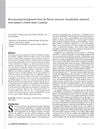 16 citations,
June 2019 in “Industrial Biotechnology”
16 citations,
June 2019 in “Industrial Biotechnology” Freezing brown seaweed right after harvesting and using microwave-assisted extraction with 75% 1,3-propanediol as a solvent is the best way to get polyphenols for cosmetics.
 7 citations,
January 2009 in “Immunological investigations”
7 citations,
January 2009 in “Immunological investigations” A 3-year-old boy lost all his hair due to a rare reaction to phenobarbital, but it grew back after steroid treatment.
 5 citations,
July 2018 in “Pediatrics”
5 citations,
July 2018 in “Pediatrics” A 3-year-old girl developed scurvy symptoms that improved with vitamin C but relapsed when supplementation stopped.
5 citations,
November 2012 in “Journal of the American Academy of Dermatology” A 3-year-old girl has short anagen syndrome, causing her hair to stay short.
3 citations,
December 2018 in “Biomedical and pharmacology journal/Biomedical & pharmacology journal” Compound 3 protects the heart from damage by activating A1-adenosine receptors.
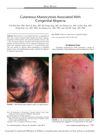 3 citations,
February 2012 in “The American Journal of Dermatopathology”
3 citations,
February 2012 in “The American Journal of Dermatopathology” A 3-year-old girl with skin mast cell buildup and congenital baldness improved with treatment, suggesting a rare link between these conditions.
 3 citations,
October 1988 in “Clinics in Dermatology”
3 citations,
October 1988 in “Clinics in Dermatology” Using 3% topical minoxidil can help women with hair loss, but more research is needed.
2 citations,
August 2018 in “Journal of pharmacopolium” The 3:2 combination of pandanus and sansevieria leaf extracts promotes the best hair growth.
2 citations,
January 1983 in “Archives of Dermatology” A 3-year-old boy's scalp infection was treated with ketoconazole.
 1 citations,
November 2023 in “iScience”
1 citations,
November 2023 in “iScience” A protein called desmoglein 3 is important for keeping hair follicle stem cells inactive and helps in their regeneration.





















